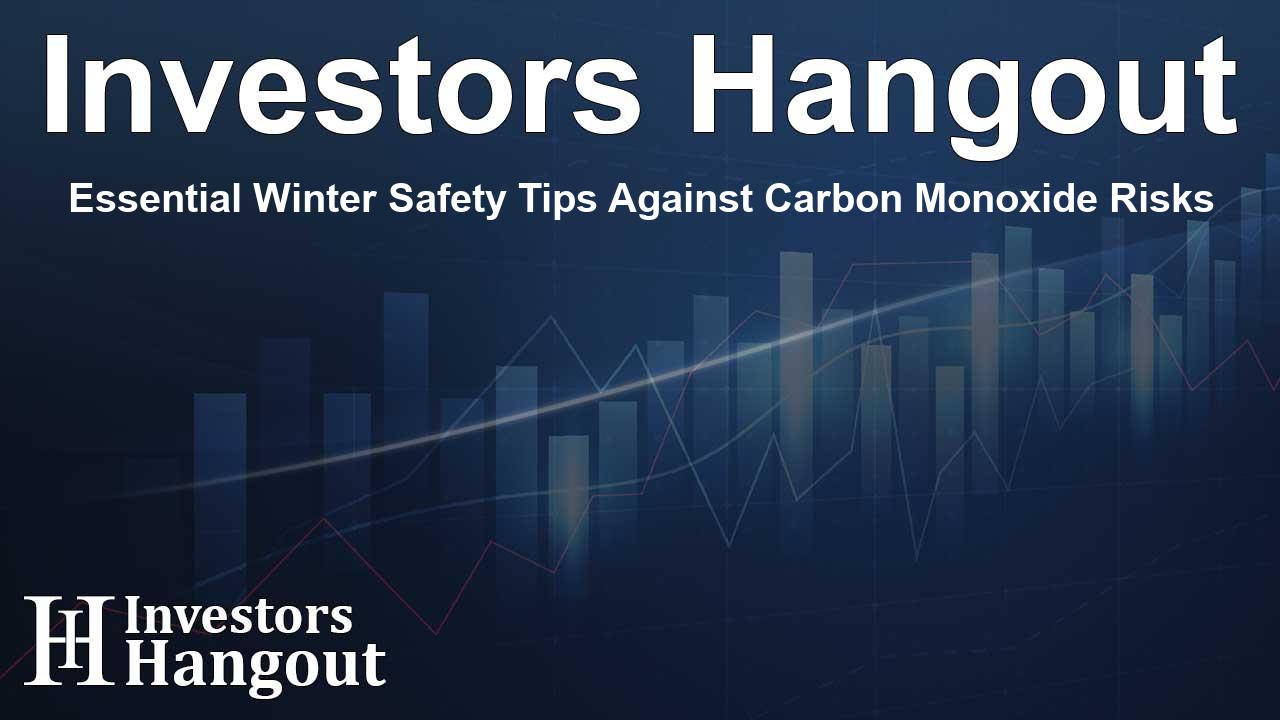Essential Winter Safety Tips Against Carbon Monoxide Risks

Winter Weather Safety Awareness
As winter weather considerably impacts many areas, families must prioritize safety by understanding potential hazards like carbon monoxide (CO) poisoning and home fires. The U.S. Consumer Product Safety Commission (CPSC) emphasizes that this season requires heightened vigilance as power outages and extreme weather can increase risks.
Safe Generator Usage During Power Outages
When storms disrupt electrical supply, portable generators become a critical resource. However, it's vital to operate them safely. These generators can cause carbon monoxide poisoning, which is often called the invisible killer due to its colorless and odorless nature. The danger is that symptoms can manifest so quickly that individuals may become unconscious without recognizing the signs, which include nausea and dizziness.
Every year, approximately 100 people in the U.S. succumb to CO poisoning linked to portable generators, highlighting the need for safety practices. Here's how to ensure family members remain safe during power outages:
Generator Operation Guidelines
It is crucial to:
- Operate portable generators only outside, maintaining a distance of at least 20 feet from homes or buildings. Avoid using them in enclosed spaces such as garages or basements, where CO can accumulate quickly.
- Properly position the generator's exhaust away from living areas to prevent any risk of poisoning.
- Follow the operational guidelines provided by the manufacturer's instructions. This may include recommendations for using generator tents during inclement weather.
- Regularly maintain the generator to ensure it functions correctly when needed, adhering to all safety warnings.
- Consider models equipped with a CO shut-off feature. This technology automatically turns off the generator when unsafe levels of CO are detected.
Importance of Carbon Monoxide and Smoke Alarms
Working smoke and CO detectors are essential in safeguarding lives. It's advisable to install battery-operated alarms or those with battery backups on every level of your home and outside sleeping areas for maximum protection. Interconnected detectors are particularly effective because when one alarms, all alarms sound.
Alarm Maintenance Tips
For optimal functionality, remember to:
- Install alarms in every bedroom and on all levels to ensure comprehensive coverage.
- Conduct monthly tests to verify their effectiveness and replace batteries when necessary.
- Clear any snow or debris away from outside vents of fuel-burning appliances to avoid dangerous buildup of carbon monoxide.
Safe Use of Portable Heaters
When using portable heaters, awareness of safety protocols can prevent fires and injuries:
Heater Safety Practices
To ensure safety:
- Keep a minimum distance of three feet from flammable materials such as furniture and bedding.
- Set the heater on a stable, flat surface to prevent it from tipping over.
- Never leave a portable heater running unattended.
- Only plug heaters directly into wall outlets; avoid using power strips and routing cords under rugs.
- Monitor children and pets around heaters, ensuring they do not come into contact with them.
Fire Hazards with Charcoal and Candles
Utilizing charcoal indoors can result in fatal carbon monoxide buildup, so it should always be banned from enclosed spaces:
Safe Practices for Candles
To manage fire risks associated with candles, do the following:
- Opt for flashlights or battery-operated alternatives instead of real candles whenever possible.
- If burning candles, never leave them unattended or place them near flammable objects. Extinguish them when leaving a room or going to bed.
Addressing Gas Leaks and Flooded Appliances
Safety steps in case of gas leaks are crucial:
Emergency Actions for Gas Leaks
If you suspect a gas leak, vacate your home immediately and call local authorities from a safer location. Avoid using electrical devices before evacuating.
Responding to Wet Appliances
After flooding, check appliances for damage before attempting to use them:
Inspection Steps
Ensure that professionals assess any appliances that may have been submerged before reconnecting them to electrical sources.
Frequently Asked Questions
What safety tips can help during power outages in winter?
Ensure proper generator use by operating it outdoors and far from the home, and maintain CO alarms for maximum safety.
How can I protect my family from carbon monoxide?
Install CO detectors throughout your home and ensure regular maintenance and testing to keep them functional.
What should I do if I smell gas in my home?
Evacuate immediately and contact gas authorities without using any electronic devices.
How can I safely use portable heaters?
Keep them away from flammable materials, and do not run them unattended or through power strips.
What are the risks of using charcoal indoors?
Burning charcoal indoors can lead to lethal carbon monoxide buildup, and should never be done in enclosed spaces.
About The Author
Contact Hannah Lewis privately here. Or send an email with ATTN: Hannah Lewis as the subject to contact@investorshangout.com.
About Investors Hangout
Investors Hangout is a leading online stock forum for financial discussion and learning, offering a wide range of free tools and resources. It draws in traders of all levels, who exchange market knowledge, investigate trading tactics, and keep an eye on industry developments in real time. Featuring financial articles, stock message boards, quotes, charts, company profiles, and live news updates. Through cooperative learning and a wealth of informational resources, it helps users from novices creating their first portfolios to experts honing their techniques. Join Investors Hangout today: https://investorshangout.com/
The content of this article is based on factual, publicly available information and does not represent legal, financial, or investment advice. Investors Hangout does not offer financial advice, and the author is not a licensed financial advisor. Consult a qualified advisor before making any financial or investment decisions based on this article. This article should not be considered advice to purchase, sell, or hold any securities or other investments. If any of the material provided here is inaccurate, please contact us for corrections.
